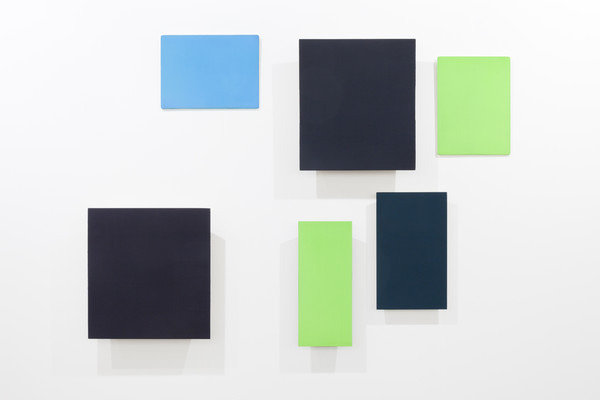Gunterg Umberg
dal 25/3/2015 al 15/5/2015
Segnalato da
25/3/2015
Gunterg Umberg
Galerie Rosemarie Schwarzwaelder, Wien
Sculptural Bodies. The show several relatively small blue pictures on the widest wall. They are all at medium height and equidistant to each other in a horizontal row, facing the beholder like a series of portraits.

For more than thirty years, Günter Umberg has been painting
monochrome pictures – primarily in black, sometimes green, and on
rare occasions in titanic orange. Working against the common notion of
monochrome painting, he is not interested in a minimalist gesture, an
analytic approach, or a demonstration of painting as a process. He
focuses rather on the definition of color – its properties and
significance – as the central medium of painting, on the translation
of color into a picture. For Umberg, monochrome means vital energy. It
is the condition for and location of unlimited opportunities; it is
both a starting point and a totality.
In Umberg’s paintings, colors are neither symbolic, nor can they be
explained on a material level. Their intensity is the result of the
repeated application of color pigments and binders in a specific
painting style that transforms the technical process into a spiritual
one. The result is an arresting, vibrant, and spatial presence of the
pictures. When looking at the Umberg’s works, the viewer's gaze is
often concentrated on the relatively small formats, the edges and
sides (the picture supports are made of wood or polyvinyl and slant
inward). The paintings seem to activate the space around them.
Umberg’s close physical relationship with color derives from an
inner logic and deeper layers of experience. In the last few years, he
has painted pictures in colors other than black. This “letting color
in” is born out of an investigation of Italian medieval,
Renaissance, and Mannerist painting. His formats remind us of small
condensed portraits and devotional paintings with a power of
expression inversely proportional to their reduced size.
Umberg’s monochrome pictures can be hung either as individual works
or solitary units, or they can be hung in groups like archipelagoes
that are precisely spaced vertically and horizontally from each other.
This kind of “Territorium” (territory) arrangement acts as a space
of perceptual experience in a pictorial and architectural sense. It
creates an open and vibrant organism within the context and site in
question. A “Territorium” is thus not a serial work, but an
assembly of works created at different times that are brought together
in this moment of time and space to define their surroundings. A
“Territorium” is a temporary and unrepeatable arrangement.
In this exhibition, the artist shows several relatively small blue
pictures on the widest wall in the first room. They are all at medium
height and equidistant to each other in a horizontal row, facing the
beholder like a series of portraits. On opposite sides of the second
room are two “territories” of black, blue, and green works that
strike up a dialogue with the beholder. In the third room are three
single works – one black, one orange-red, and one black-green –
the intensity of which defines the gallery space.
Günter Umberg was born in Bonn, Germany, in 1942. He lives and works
in Cologne, Germany, and Corberon, France. Selected exhibitions
include: Bernard Frize - Günter Umberg, Fondation Fernet-Branca, St.
Louis, France (upcoming); Museum für Lackkunst, Münster, Germany
(2009); Haus Konstruktiv, Zurich, Switzerland (2006-2007); Städtische
Galerie, Karlsruhe, Germany (2006); Fred Thieler Preis für Malerei,
Berlinische Galerie, Berlin, Germany (2005); Body of Painting, Museum
Ludwig, Cologne, Germany (2000) and Museum Dhondt-Dhaenens, Deurle,
Belgium (1998).
Image: Günterg Umberg, courtesy of the artist and Galerie nächst St. Stephan Rosemarie Schwarzwälder, Vienna
Press office:
David Ulrichs PR I david@david-ulrichs.com I +49 (0)176 5033 0135
Galerie nächst St. Stephan
Rosemarie Schwarzwälder



